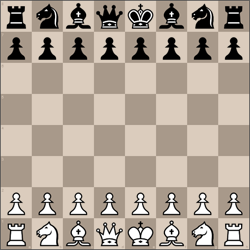< Prev Index Next >

MEMBERS OF THE CORNELL CHESS TEAM WHO WON PERMANENT POSSESSION OF THE RICE TROPHY
 Chess 04 Jan 1903, Sun Brooklyn Eagle (Brooklyn, New York) Newspapers.com
Chess 04 Jan 1903, Sun Brooklyn Eagle (Brooklyn, New York) Newspapers.com
Brooklyn Eagle, Brooklyn, New York, Sunday, January 04, 1903, p. 43
Cornell Now Owns Rice Chess Trophy.
Small Margin Decides Triangular College Chess League Tournament.
QUAKERS MAKE A GOOD FIGHT.
Rand of Brooklyn and Mitchell of Manhattan the Successful Team.
The Records.
At the end of the fourth round of the Triangular College Chess League tournament, held at the rooms of the German Press Club during the past four days, the Cornell team emerged victorious for the third consecutive time, ½ a point ahead of the team of the University of Pennsylvania.
Charles L. Rand of Brooklyn and James R. Mitchell of Manhattan, the members of the winning team, scored a total of five games, each tallying 2½ points.
Under the terms of the deed of gift, the trophy, presented by Isaac L. Rice of Manhattan, becomes the permanent property of Cornell. University of Pennsylvania won this emblem in the initial contest, but since then it has been monopolized by the Ithacans.
The final round began at 9 o'clock yesterday morning, with the players paired in the following order:
Rand (C.) vs. Addleman (P.), Smyth (P.) vs. Hicks (B.), Mitchell (C.) vs. Easton (B.)
As Cornell needed only 1 point to clinch the victory, Rand and Mitchell played for a draw and succeeded in attaining the object.
Rand opened hostilities with a Ruy Lopez. Addleman instituted a premature attack and could not avoid a wholesale exchange of pieces. The Pennsylvanian finally made a desperate attempt at forcing the issue, sacrificing two pawns, without, however, getting any equivalent.
With a winning game in hand, Rand proposed a draw, on the thirty-ninth move, which Addleman accepted.
In the second game Cornell was favored by fortune. After repelling Mitchell's attack, Easton assumed the offensive, winning a pawn on the twenty-fifth move. By choosing an inferior continuation he gave Mitchell a chance to recover and a few moves afterward a draw was agreed to.
The game between Smyth and Hicks was evenly contested up to the twenty-fifth move, when Hicks lost a piece by an oversight, and resigned the game.
At a business meeting, held at the conclusion of the tourney, Charles L. Rand, Cornell, was elected president of the league, and Capwell Allen of Brown, another Brooklynite, secretary and treasurer.
Resolutions of thanks were passed to Herman Ridder of the New Yorker Staats-Zeitung, whose guest the collegians were at the German Press Club, and the house committee of that club for the use of the rooms where the games were played.
Another resolution was passed to the effect that the next tournament should be played in New York City on December 30 and 31 and January 1 and 2.
Charles L. Rand of the winning team is well known in local chess circles, being a native of this borough and 20 years old. At different times he has been a member of the Boys' High School Chess Club, Bishops Chess Club and Central Y. M. C. A. Chess Club.
James R. Mitchell is a Manhattan lad of eighteen summers, and a member of the Manhattan Chess Club, in whose handicap tourney he played last year. His acquaintance with the game extends over a period of only three years. He is a freshman at Cornell.
Charles Lyman Rand (white) vs. Samuel Wolf Addleman (black)
Ruy Lopez: Morphy Defense, Classical Defense Deferred
Submitted to chessgames.com on 05/07/2025
James Ferguson Smyth (white) vs. Leslie Robert Hicks (black)
Ruy Lopez: Closed, Morphy Attack
Submitted to chessgames.com on 05/08/2025
James Reid Mitchell (white) vs. Stephen Howard Easton (black)
Scotch Game: Schmidt Variation
Submitted to chessgames.com on 05/08/2025
The final team totals were as follows:
Colleges Cornell......... 5 - 3 Pennsylvania.... 4½ - 3½ Brown........... 2½ - 5½
The individual scores were:
Mitchell........ 2½ - 1½ Rand............ 2½ - 1½ Addleman........ 2½ - 2½ Smyth........... 2 - 2 Easton.......... 2 - 2 Hicks........... ½ - 3½
The records of the four tournaments thus far contested are appended:
Year Cornell U of P. Brown 1899............ 5½ 6 ½ 1900............ 5½ 3 3½ 1901............ 4½ 2½ … 1902............ 5 4½ 2½
Brown was not represented in the tourney of 1901.























